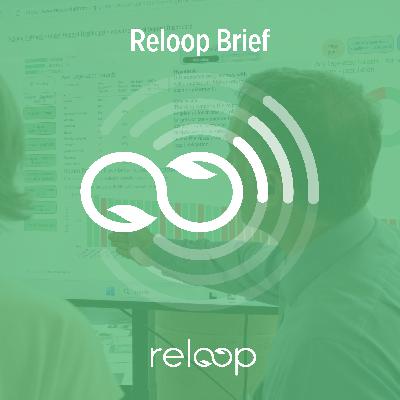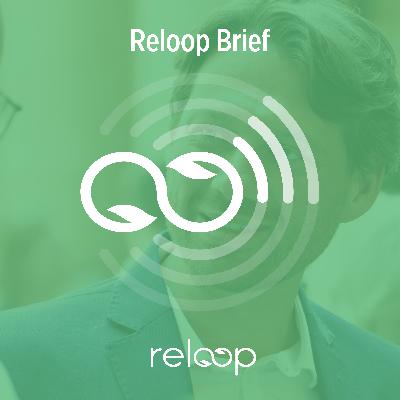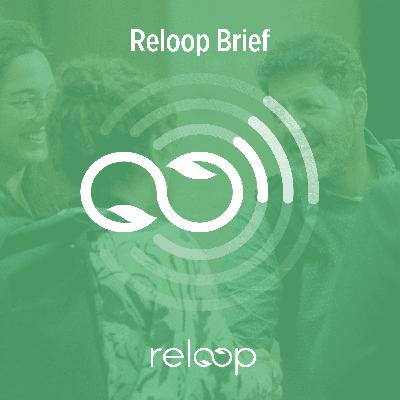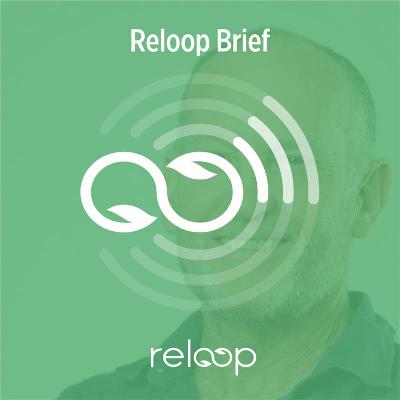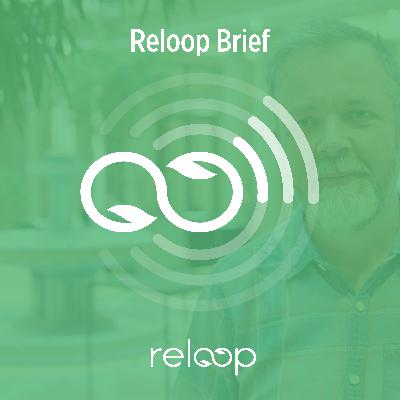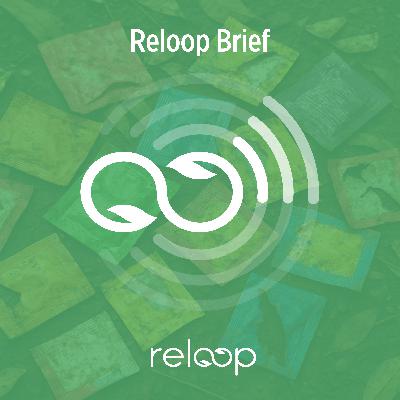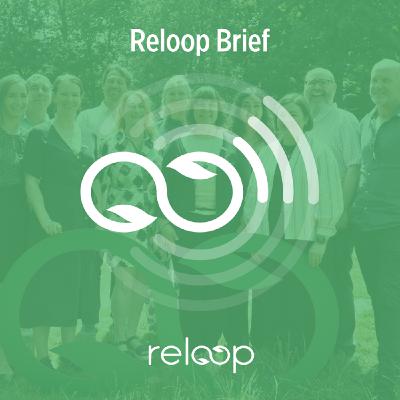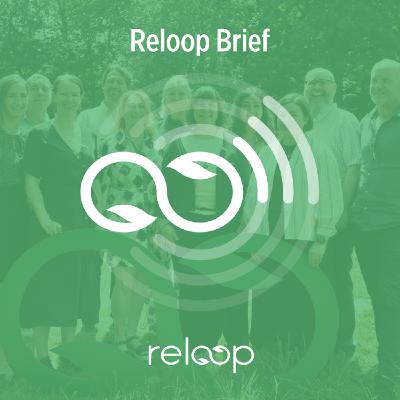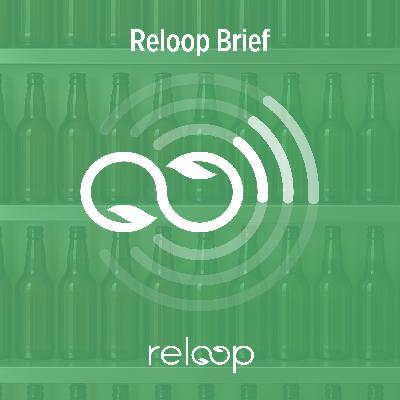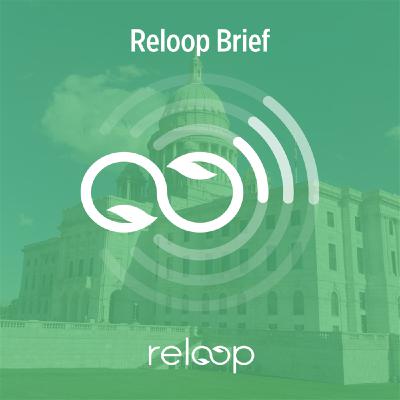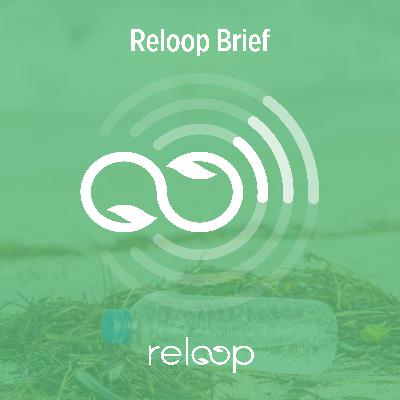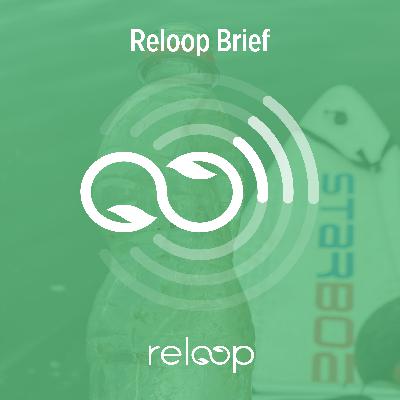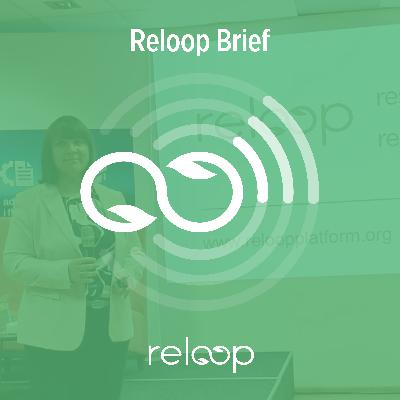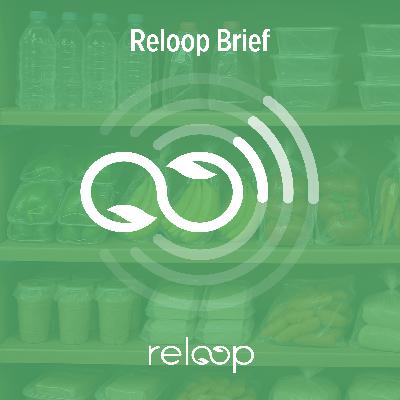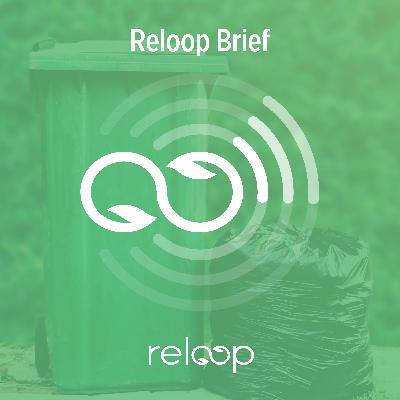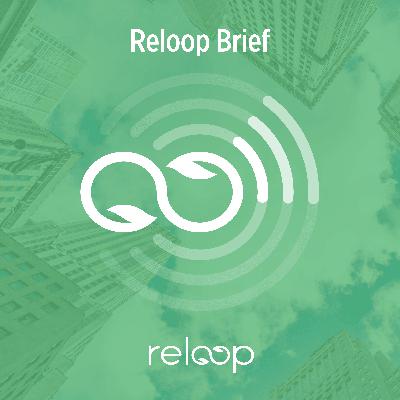Discover Reloop Brief
Reloop Brief

Reloop Brief
Author: Reloop
Subscribed: 0Played: 0Subscribe
Share
© Reloop 2025
Description
Join Reloop's directors and industry experts for a concise and insightful look at key issues shaping the circular economy.
This podcast brings you the latest policy updates, industry news, breakthrough innovations, and inspiring success stories.
27 Episodes
Reverse
In this year-end special, we rewind through an eventful 2025—the year that Reloop turned ten and The Reloop Brief began. Host, Barry Snedden revisits standout moments from the season: activist Merijn “Plastic Soup Surfer” Tinga live from his paddleboard; Jackie Núñez on moving beyond “straws” to system change; Reloop CEO Clarissa Morawski on hard data proving deposits cut beverage litter; Data & Dashboard Manager Jason Wilcox on turning evidence into action with “What We Waste” and the "Global Deposit Dashboard", as well as Reloop Pacific’s Rob Kelman on Australia becoming the first continent fully covered by deposit systems—and what it takes to keep return rates high.From grassroots sparks to policy implementation, the episode threads one story: credible data + citizen pressure + informed policy = circular outcomes.
In this episode, Barry Snedden takes us behind the scenes with Jason Wilcox, Reloop’s Data & Dashboard Manager, to see how evidence turns into action. Jason explains the goals of Reloop's two live dashboards: What We Waste and the Global Deposit Dashboard. They discuss the work that goes into building these interactive tools: consolidating disparate spreadsheets, analysing from a “bird’s-eye view” to reveal patterns, and then using simple visuals to tell a clear story, backed by transparent, clickable sources for each data point. Jason also provides a sneak peek at his next build, aiming to quantify which policies most effectively cut litter.
Spain is on the cusp of introducing a national deposit return system for beverage containers by 2026. In this episode, Barry Snedden sits down with Miquel Roset, Director of Retorna, to discuss what must happen next to deliver the DRS on time. They also touch on Portugal’s newly announced DRS start date and why Iberian momentum matters, Retorna’s work co-founding the Global DRS Platform to support deposits across the Global South, and a preview of Madrid’s upcoming Global Conference of Experts - a first-rate gathering of system operators, NGOs, governments and industry to swap lessons and discuss best practice.
For this episode, we visit France as Shraddha Kumar checks in with Reloop’s Director for France and Francophonie, Alexis Eisenberg.Together, they cover why a national deposit return system is still pending, how a major pilot is rolling out across four regions, and what Reloop's Tour de France de la consigne revealed about the future of reuse and recycling.Plus, how the EU’s new packaging rules (PPWR) fit with France’s own targets — and whether a mixed DRS could be the way forward.
To mark Reloop’s 10th anniversary EU Green Week event—Reloop Unpacks—we asked participants two simple questions: What will the next 10 years bring for the circular economy and for Reloop? What were your key takeaways?In this recap, you’ll hear insights from conference attendees, from Deutsche Umwelthilfe, Fair Resource Foundation, Eunomia, and Retorna. Themes converge on a practical roadmap: design for prevention and reuse, make consumer returns effortless (retail take-back), fund with robust EPR, measure with shared, transparent tools, and scale successes globally, especially through North–South collaboration.
In this episode of the Reloop Brief, Shraddha Kumar catches up with Reloop's Director for the Pacific, Rob Kelman, on the latest from Australia. With several states expanding existing schemes to include wine & spirit bottles in container deposit schemes (and what that means for curbside costs and glass quality), to Tasmania’s strong early returns (~30 million containers since May 2025) and why refund value and retail take-back matter for engagement. The discussion also touches on South Australia’s ban on the tiny soy-sauce fish and the case for a robust, national EPR for packaging.
In this special episode of the Reloop Brief, we listen in on the Reloop Unpacks conference held in Brussels in June 2025. Clarissa Morawski moderates a fast-moving panel on how digital and AI tools are reshaping the way we track, sort, and return materials in a circular economy. Panellists include Weronika Czaplewska (COO & Co-Founder, Envirly), Stéphane Cren (Head of Innovation, GS1 France), Mark Roberts (Sustainability & Circular Economy Director, Amcor), and Wolfgang Trunk (European Commission).The discussion dives into AI-enabled high-quality sorting, smart prompts that keep recyclables out of the black bag, and the trade-offs between “just enough tech” and tech overload. The panel also explores Digital DRS, from serialised QR codes on single-use packaging to tracking rotations for reusables, and discusses their cost impacts for stakeholders across the value chain. The conversation makes clear that there is a pressing need for clearer regulatory guidance and standardised methods to ensure data transparency and comparability across companies.
In this episode of the Reloop Brief, Barry Snedden checks in with Joe Papineschi, Chairperson for Eunomia Research & Consulting, for a post-INC 5.2 debrief. They unpack why the plastics treaty negotiations ended without a deal, what actually moved forward, and how the Chair’s draft text was received (first, an over-watered proposal that was rejected by all sides, then a still-compromised framework with too many unresolved options to conclude).Joe explains the persistent polarisation since INC-2 (production limits vs. waste-only focus), the parallel fault line on financing, and why private-sector contributions, especially a primary plastic polymer fee, are gaining attention amid thin public funds. Joe sheds some light on the most plausible paths ahead.
In this episode of the Reloop Brief, Shraddha Kumar is joined by Marian Ledesma, Zero Waste Campaigner for Greenpeace Philippines, to unpack the complex reality of sachet economies. Marian explains how small, multilayered plastic packets, ubiquitous across South and Southeast Asia, have become a symbol of both corporate convenience and systemic inequality. The conversation explores how producers drive the sachet crisis, what policies like Extended Producer Responsibility are doing to address it, and how local communities are adapting through innovative, yet traditional, refill and reuse models. Marian shares lessons from the Philippines and outlines what real leadership and accountability from corporations could, and should, look like.
As INC-5.2 approaches, we take a closer look at one of the most talked-about ideas in the global plastic treaty negotiations: a primary plastic polymer fee. What is it, how would it work, and why does it matter? In this special extended episode of the Reloop Brief, host Barry Snedden speaks with Hugo Schally, retired European Commission official and former lead EU negotiator on plastics, Oliver Boachie, former special advisor to Ghana’s Ministry of Environment and lead negotiator for the African group, and Clarissa Morawski, Reloop’s CEO and co-founder.Together, they explore how a small upstream fee could deliver major financing for plastic pollution solutions, especially in the Global South. They also unpack the deadlocks and divisions ahead of INC-5.2, and what might happen if the treaty falls short.
To mark Reloop’s 10th anniversary, Barry Snedden sits down with CEO and co-founder Clarissa Morawski for a look back at the organisation's first decade. From navigating a changing EU policy landscape to pushing ambitious circular economy legislation, Clarissa shares key milestones in Reloop’s journey. Clarissa recounts Reloop's role in shaping the Single-Use Plastics Directive and advancing the EU Packaging Regulation, to influencing global plastics treaty negotiations.The conversation explores how strategic partnerships, evidence-based advocacy, and trusted data tools like Reloop’s dashboards have helped build momentum for systemic change. With reuse now embedded in EU law and DRS policies scaling globally, this episode reflects on how far Reloop has come and where it’s headed next.
To mark 10 years of Reloop, we’re going back to where it all started. In this two-part anniversary series, host Barry Snedden speaks with Reloop’s CEO and co-founder, Clarissa Morawski, to explore the origins of the organisation and the values that have shaped it.In Part 1, we hear how Clarissa’s roots in Canadian environmental consulting and her love of data storytelling laid the foundation for Reloop’s work. We meet some of the team members who were there from the beginning and learn how Reloop went from a two-person operation to a global NGO helping shape circular economy policy around the world.With stories from Barcelona, Ontario, and Poland, this episode paints a picture of Reloop's bold beginnings.
In this episode of The Reloop Brief, we explore the global decline of reusable beverage containers and what can be done to reverse it. Barry Snedden is joined by Anna Larsson, Reloop’s Circular Economy Development Director, who unpacks the reasons behind the shift toward single-use packaging, the role of deposit return systems in supporting reuse, and how upcoming EU regulations could help turn the tide, and how HoReCa can play a key role.With the EU’s Packaging and Packaging Waste Regulation setting a 10% reuse target, Anna looks ahead to a more coordinated future, where reuse becomes a mainstream part of sustainable packaging policy.
In this episode, we head to Rhode Island (USA), where the new Senate Bill 996 and House Bill 6207 are setting out to change how the state handles packaging waste and litter. Senator Mark McKenney, the bill’s sponsor, speaks to Jenni Hume about how two proven tools, Extended Producer Responsibility and Deposit Return Systems for beverage containers, can help protect the Ocean State’s natural beauty, boost recycling rates, and support local economies.Senator McKenney explores the environmental and economic motivations behind the legislation, highlighting its potential to create jobs while drawing on proven models from other states and countries. He emphasises the importance of holding industry accountable for the waste it generates, positioning the bill as a step towards long-term benefits for the state.
In this special episode, Barry Snedden sits down with Reloop CEO Clarissa Morawski to dive into the hard facts on beverage container litter, and the most effective solution we have at our disposal today: deposit return systems.Drawing from Reloop’s newly released factsheet, Littered with evidence: Proof that deposit systems work, Clarissa explains how DRS is an effective tool in reducing container litter by up to 75% across regions like Europe, North America and Australia. With more than 1.3 trillion beverage containers sold globally each year, and a vast majority ending up in landfills or polluting the environment, the conversation highlights why mass-based data, not anecdotal observations, should be at the core of policy design.The discussion unpacks the importance of meaningful measurement, and talks about how credible data brings accountability and ensures that policy is grounded in fact, reinforcing the urgent need for countries to act now in order to keep packaging in the loop.
In this special episode of the Reloop Brief, we catch up, live from a paddleboard, with Merijn Tinga, also known as the Plastic Soup Surfer, during his expedition from Paris to Nice for the UN Ocean Conference. Merijn shares how his creative activism, surfing on a board made of plastic bottles, sparked a national movement that helped advance and expand a deposit return system in the Netherlands.He explains how deposit systems reduce beverage container litter by up to 80%, the role of grassroots action and AI-powered litter research and why empowering local groups is key to scaling effective waste policy across Europe. It’s a story of determination, data and the power of community.
In this episode of The Reloop Brief, we’re taking a quick look at Extended Producer Responsibility (EPR) – what it is, how it started and where it's heading – with insights from Anna Larsson, Reloop’s Circular Economy Development Director.We look at how EPR has evolved across Europe, explore what’s driving current trends and discuss one of its most critical elements: financing. It’s a key part of making EPR work in practice.
In this episode of the Reloop Brief, we head to Toronto to sit down with Karen Wirsig, Senior Program Manager for Plastics at Environmental Defence. Karen shares insights on Canada’s current plastics policy landscape, the role of public opinion in shaping federal action and talks about why stronger enforcement and reuse infrastructure are essential for tackling single-use packaging. A recent poll shows that 86% of Canadians support federal action on plastics, across all provinces and political affiliations.From the growing problem of unnecessary and harmful plastics on grocery shelves to deposit return shortfalls in Ontario, the discussion breaks down where progress has been made and where it might still be lacking, but emphasizing foremost the importance of global cooperation and the role Canada must play in addressing the plastic crisis.
In this episode, Barry Snedden is joined by Anna Larsson, Reloop’s Director of Circular Economy Development, to explore the critical role of mixed waste sorting in boosting recycling rates and reducing emissions. Anna explains why focusing only on source-separated recyclables like bottles and cans isn't enough anymore. Valuable materials are still hidden in black bags, and mixed waste sorting is the key to recovering them. We learn why mixed waste sorting should be seen as a tool for governments and policymakers alongside other methods, as it provides various recyclables for circular production models, and it even has the potential to reduce waste sector-related emissions by 21%. The conversation unpacks how this approach could strengthen recycling efforts, without being as costly or as complicated as it may seem.
In this episode Reloop's Global Networks Director, Jenni Hume, speaks with Blair Horner from the New York Public Interest Research Group (NYPIRG) about efforts to modernise New York’s deposit return system (known as the Bottle Bill), which was enacted in 1982.As the state faces mounting waste and landfill challenges, advocates are calling for a "Bigger, Better Bottle Bill" that includes expanding the scope to more types of containers and increasing the deposit value. As the momentum builds behind bottle bill reform this episode sheds light on the findings of a new Eunomia report commissioned by Reloop and NYPIRG, which outlines how a modernised bill could save New York municipalities millions of dollars, reduce litter, and divert 5.5 billion bottles and cans from landfills each year. Visit https://www.nypirg.org to learn more.



